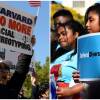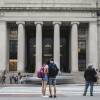Harrison Chen doesn't like to brag, but the 21-year-old son of Chinese immigrants graduated at the top of his high school class and logged almost perfect scores on the SAT. Still, Harvard rejected his application. The reason, he alleges, was discrimination.
“They just lumped me into the Asian category, and the data quite clearly shows that,” Chen said, charging without evidence undergraduate admissions officers there “were not willing to look at us as individuals.”
Chen echoes arguments of other frustrated Asian-American critics who are suing Harvard, whose holistic approach to evaluating applicants has in the past won praise from the Supreme Court. During a three-week trial in Boston in 2018, no former applicants took the stand to say Harvard rejected them because of their race. Instead, the plaintiffs relied on statistics, arguing the school's admissions officers methodically hold Asian Americans to higher standards.
But U.S. District Court Judge Allison Burroughs and the 1st Circuit Court of Appeals in Boston ruled Harvard does not discriminate against Asian Americans, who account for 24 percent of Harvard’s latest class and just 6 percent of high school graduates.
As the Supreme Court weighs whether to hear the case, two Chinese Americans not involved in the lawsuit have granted GBH News interviews to claim — without concrete evidence — that they were denied admission to Harvard or Princeton because of their race and ethnicity. National origin is not an issue in the lawsuit.
“Asian Americans are incredibly diverse,” said Natasha Warikoo, who teaches sociology at Tufts University and writes in her book The Diversity Bargain about how students at selective colleges think about merit and race.
While some Asian Americans like Chen believe they are being held to higher standards, Warikoo says that’s a less common view in the community.
“When we look at national surveys of Asian Americans, a majority of Asian Americans support affirmative action,” Warikoo said. “That percentage seems to be declining slightly among Chinese Americans.”
A 2020 voter survey found 70 percent of Asian Americans supported affirmative action, while 16 percent opposed it. Chinese Americans were the least likely ethnicity to support the practice, with 56 percent of them in favor.
Warikoo, who is Indian American, says the idea that Asians are a model minority is complicated.
“Asian Americans certainly do face discrimination, deadly at times, as we know all too well in recent months,” she said. “On the other hand, Asian Americans are doing quite well in education.”
That level of achievement results in part, she explains, from many new Asian immigrants — many of whom are from India or China — “that are largely professionals coming through high-skilled immigration visas.”
Many hold college degrees, so their children tend to have strong test scores and grades and then apply to selective colleges at much higher rates than other groups.
A new study from Georgetown University’s Center on Education and the Workforce, though, found if applicants were admitted to the 91 most selective colleges based on test scores alone, the percentage of Asian Americans admitted would increase only slightly.
Anthony Carnevale, a white economist who led the study, said his research found that under SAT-only admissions, the Asian-American presence at top colleges would increase by a net of two percentage points. That's fewer than 3,000 seats out of 120,000.
“You pick up a few thousand, you lose a few thousand,” Carnevale said.
While Asians, on average, have better scores, the study finds 21 percent of Asian-American applicants who were previously admitted would no longer be because some, in fact, benefit from colleges considering race in admissions.
Carnevale maintains this arithmetic debunks the arguments of Asian-American critics.
"They're just barking up the wrong tree on this one,” he said. “If you did this purely on the purest academic metric that we have, for all its flaws, there's no gain here. It's a wash.”
Supporters of the lawsuit against Harvard don’t buy it.
“They studied the 91 most selective universities? Are you serious?” said Kenny Xu, a D.C.-based writer who focuses on identity politics and is the author of the book An Inconvenient Minority: The Attack on Asian American Excellence and the Fight for Meritocracy.
“Asian Americans are not alleging discrimination by Swarthmore and Georgetown. We’re alleging discrimination by the most highly selective universities,” Xu said.
The group behind the lawsuit, Students for Fair Admissions, however, is also suing the University of North Carolina at Chapel Hill and the University of Texas at Austin.
Xu, the 23-year-old son of highly-educated Chinese immigrants, graduated from Davidson College in North Carolina, where he majored in math.
With near-perfect SAT scores and a 4.4 GPA in high school, he had applied to Princeton and, like Harrison Chen, claims he was discriminated against because of his race.
“I was president of the school's prayer group and I was deferred and then rejected from Princeton even though there are many kids who were of a different race who got in with I guess you would call it, inferior objective metrics,” Xu said.
Pointing to data presented during the Harvard trial in Boston, Xu argues Asian Americans are the “inconvenient minority” because they outperform whites academically, challenging the notion that white supremacy is baked into society.
“If whites were so intent upon protecting their supremacist structure, why did they allow Asian-Americans to do better than them on SATs, to go to college at higher rates than them, to be more financially successful than them?” he asked rhetorically. “The only way you can explain Asian-American excellence is not through critical race theory or through race. It is through culture.”
Xu asserts Asian Americans put a high priority on education and test-taking. In many Asian countries, college admissions are done in rank order by test score although India has quotas for low-caste applicants, a constitutionally authorized practice that is controversial with upper caste Hindus.
As for Harrison Chen, who lives in Cary, North Carolina outside Raleigh, he agrees with Xu's idea that Asian Americans are an "inconvenient minority."
“They’re just in no man's land, because some people want to put Asian Americans as white adjacent because we make a lot of money and we get into good schools at a higher rate,” he said.
Chen is now a rising senior at Vanderbilt University in Nashville, Tennessee, where, he says, he’s happy and healthy, but Harvard’s rejection still stings.
“The smallest minority is the individual,” he said. “People don't care about what you have to say or what you’ve achieved. They just compare you to other people in this ethnic group. So all your achievements and everything you've been through, it feels like it's worth less.”
Chen is confident, he and other Asian Americans alleging Harvard discriminates against them will get the four justices they need to hear the case before this country’s highest court. In June, the justices deferred a decision while they await an opinion from the Justice Department under President Joe Biden. Under Donald Trump, the department sided with the Asian American plaintiffs.
GBH News' Diane Adame contributed to this story.








